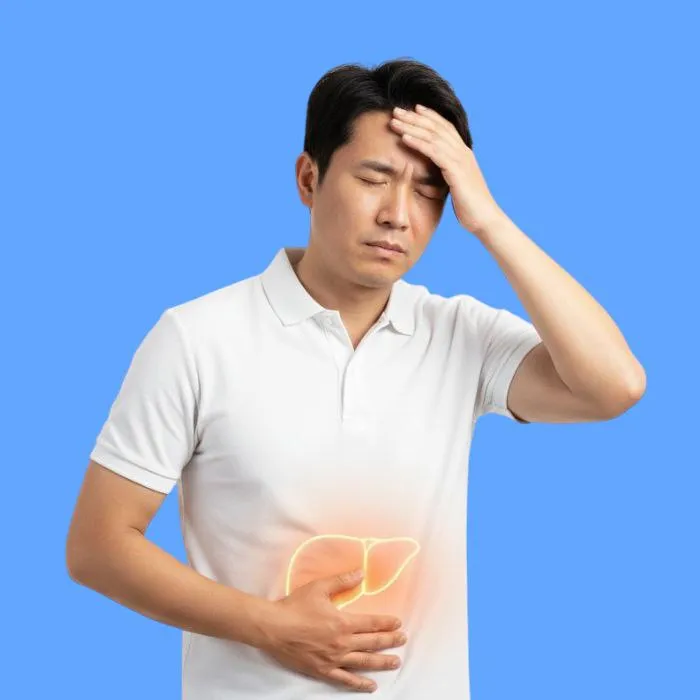What is fatty liver disease?
Fatty liver disease is a condition in which fat accumulates inside liver cells, affecting its vital functions.
This accumulation may be mild at first, but if neglected, it may develop into inflammation or cirrhosis of the liver.
What are the causes of fatty liver disease?
Fatty liver disease occurs as a result of several factors that affect metabolism and lifestyle, such as:
- Eating foods rich in saturated fats and fried foods.
- Lack of movement and physical activity for long periods.
- Obesity and excess body fat.
- Excessive consumption of alcoholic or sugary beverages.
- Type 2 diabetes.
- Use of medications that directly affect the liver.
What are the common symptoms of fatty liver disease?
The symptoms of fatty liver disease appear gradually and vary from person to person. The most prominent are:
- Constant feeling of fatigue and general exhaustion.
- Pain or mild heaviness in the right side of the abdomen.
- Occasional loss of appetite or nausea.
- Weight gain or abdominal bloating.
- Yellowing of the skin and eyes in advanced stages.
When should you see a doctor?
It is best to see a doctor immediately if you experience persistent or unusual symptoms, such as:
- Persistent fatigue or abdominal pain without a clear cause.
- Notice of yellowing of the skin or whites of the eyes.
- Unexplained weight loss.
- Suspicion of inflammation or bloating in the abdomen.
- Continuous use of medications that affect the liver.
What are the methods for diagnosing fatty liver disease?
To diagnose fatty liver disease, a doctor relies on a series of tests and examinations, such as:
- A clinical examination and review of the patient's medical history.
- Blood tests to measure liver enzymes and ensure liver function.
- Ultrasound to determine the degree of fat accumulation.
- Additional tests, such as a CT scan or liver biopsy, may be necessary.
What are the methods for treating fatty liver disease?

Treatment for fatty liver disease focuses on improving lifestyle and adhering to healthy habits, such as:
- Following a balanced, low-fat diet.
- Exercising regularly to stimulate fat burning.
- Abstaining from alcohol and soft drinks.
- Losing weight gradually and safely.
- Only taking medications prescribed by a doctor.
Is it possible to cure fatty liver disease?
In most cases, fatty liver disease can be cured by adhering to treatment and making lifestyle changes, such as:
- Reducing fats and sugars in the diet.
- Exercising regularly.
- Regular follow-up with a doctor to monitor improvement.
- Adhering to medication when needed.
What are the tips for preventing fatty liver disease?
Preventing fatty liver disease helps avoid complications and maintain liver health. The most important tips include:
- Maintaining a healthy weight appropriate for your height.
- Eating a balanced diet containing fruits and vegetables.
- Drinking adequate amounts of water daily.
- Reducing the consumption of processed and fried foods.
- Avoiding smoking and soft drinks.
- Conducting periodic liver function tests.
What are the potential complications of fatty liver disease?
Neglecting treatment for fatty liver disease can lead to serious complications over time, such as:
- Progression of the disease to chronic steatohepatitis.
- Cirrhosis or complete liver failure.
- Increased risk of liver cancer.
- Irregular blood sugar and lipid levels.
- Fluid accumulation in the abdomen (ascites).
Frequently Asked Questions About Fatty Liver Disease
Is fatty liver disease dangerous?
It only becomes dangerous if treatment is neglected or progresses to cirrhosis.
Is fatty liver disease completely curable?
Yes, in the early stages, the liver can fully recover with adherence to treatment.
Is it safe to exercise while suffering from fatty liver disease?
Yes, it helps reduce fat and improve liver function.
Does fatty liver disease cause weight gain?
It is often associated with excess fat and general obesity.
Article Summary
Fatty liver disease is a silent disease that can be easily prevented through proper nutrition and regular physical activity.
Awareness of the disease and follow-up with your doctor for any changes are key to maintaining a healthy liver for life.
Don't ignore minor symptoms, as early detection makes the difference in recovery.